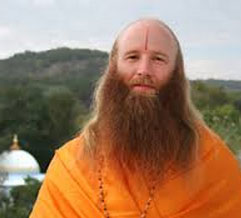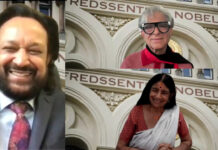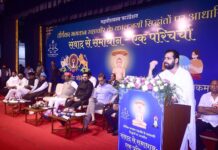 After hearing Shree Krishna’s explanation of karm yog and the state of perfect yog or union with God, Arjun enquires about the characteristics of a God realized (sthitapragya) soul. Arjun wishes to know how God-realized personalities talk, sit, and behave in the world (chapter 2, verse 54). ‘Sthitapragya’ means one whose mind is always established in pure knowledge, and never forgets Shree Krishna even for a moment.
After hearing Shree Krishna’s explanation of karm yog and the state of perfect yog or union with God, Arjun enquires about the characteristics of a God realized (sthitapragya) soul. Arjun wishes to know how God-realized personalities talk, sit, and behave in the world (chapter 2, verse 54). ‘Sthitapragya’ means one whose mind is always established in pure knowledge, and never forgets Shree Krishna even for a moment.
Characteristics of an Enlightened Soul
Here it is important to note that in response to Arjun’s question, Shree Krishna describes the internal characteristics of a sthitapragya individual, not any external attributes. He says that one who is sthitapragya is free from desire, attachment, fear and anger, has control over his senses and mind, and is self-contented (chapter 2, verses 55 & 56).
Why is a God-realized soul free from desire? Upon attaining God, Who is the very form of happiness, the God realized soul experiences perfect, unlimited happiness at all times, and there is nothing left for him/her to desire.
They are also devoid of attachments. The fundamental reason behind attachments is repeated contemplation upon an object of desire. Since a God-realized personality is situated in perfect bliss at all times, he does not have any further desires and thus, does not form any attachments.
We all experience constant fear – fear of losing the people and objects we are attached to. Fear is born out of ignorance. When we believe ourselves to be the body, then we fear death; when we believe the things of the world belong to us and are the source of happiness, then we fear losing them.
The sthitapragya individual is free from such delusions – he understands that he is not the body but the soul within, that material possessions are only temporary, and that God is the source of true happiness. Thus, he neither fears the death of his physical body, nor the loss of material possessions or relations.
One of the common questions that I encounter is “Swamiji, why do I get angry?” The reason is simple. When we form a desire, there can be only two scenarios. The desire may either get fulfilled or remain unfulfilled. If the desire gets fulfilled, we experience greed or the hankering for further desires. In the second case when our material desires go unfulfilled, we naturally experience anger or frustration. Since the sthitapragya individual is free from desire, there is no question of anger ever arising.
How does an enlightened soul gain control over their senses and mind? It is only the desire for material enjoyment that attracts the senses and diverts the mind. This makes it difficult for an ordinary person to control his senses and mind. Since the sthitapragya person is free from desire, he has complete control over his senses and mind.
Why is the sthitapragya soul self-contented? The God realized person enjoys a permanent experience of Divine bliss which is independent of any external stimulus. Upon becoming God-realized, the connection with God is internal, and cannot be disturbed by any outside influence. Such a soul is contented in and of himself, and doesn’t require any input or experience from the outer world to make him happy.
Shree Krishna describes one more characteristic of the sthitapragya individual when He says that such a person is neither delighted upon receiving what is favorable, nor upset upon receiving what is not favorable (chapter 2, verse 57). This is possible because the individual is self-contented.
External attributes of an enlightened soul are unreliable
Why did Shree Krishna not describe any external characteristics of a God realized person? Because there are no reliable outer attributes which could be defined. Externally, the person is still the same as they were before they became God realized – they have only changed internally (as described above). There is no color of cloth or style of clothing that is worn by a God realized person.
There is no requirement to shave the head, or grow the hair, or grow a beard. There is no requirement to live in the jungle, or a cave, or an ashram. There is no requirement to be a sanyasi, to leave the family, or to leave the world. So if someone were to rely on these external markers to judge whether another is God realized or not, they would be wrong more times than not.
Shree Krishna even states that someone may renounce the world physically (deny themselves material enjoyments and comforts), yet their mind will continue to harbor thoughts of worldly pleasures. They will only be free of such desires when they have attained God (chapter 2, verse 59). Thus, it would be wrong to conclude that just because a person has a high degree of physical renunciation, that they are God realized.
Conversely, the God realized individual, although free from attachment and desire, still makes use of the material things (chapter 2, verse 64). They may live an ordinary life in the world, with a job and a family. They may even live an extraordinary life in the world, like Prahlad, Dhruv, Ambarish and Janak, all of whom ruled great kingdoms. Therefore, to recognize a God realized person requires getting to know what is in their heart and mind, not just observing their external lifestyle and behavior.
In the end, Shree Krishna tells that just as the ocean is unmoved even as water from various rivers enters into it from all sides, similarly, one whose mind is fixed in God remains undisturbed, even while in contact with all the objects of enjoyment of this world.
Only such a person attains ultimate peace, not the one who wishes to fulfill material desires (chapter 2, verse 70). He says that this is the state of one who has realized God. Upon achieving this state, one is never deluded again. Being fixed in this state even at the moment of death, one is freed from the cycle of birth and death and attains Divine bliss forever (chapter 2, verse 72).
Even after hearing this explanation from Shree Krishna, Arjun still had more questions. At the beginning of the third chapter, he questions why it is necessary to fight the war if the ultimate goal is to go beyond this world. We will discuss Shree Krishna’s answer in the next article.
Disciple of Shree Kripaluji Maharaj:
Swami Nikhilanand Ji is a Canadian born Hindu spiritual leader based in Austin, Texas. He is a sanyasi disciple and pracharak of Jagadguru Shree Kripaluji Maharaj.
Attracted to the teachings of Hinduism from a young age, Swamiji eventually let his deep spiritual longing lead him to India, where he was most fortunate to come under the guidance of Shree Kripaluji Maharaj. Thereafter, living in the ashrams of JKP, he extensively studied Hindi, the philosophy of the prime Sanskrit scriptures (Vedas, Darshan Shastras, Gita, Bhagwatam), and practiced meditation in the tradition of raganuga bhakti. In 2003, he was given sanyas.
Swamiji conducts weeklong Family Gita classes across various cities in the U.S. Through these enlightening sessions, Swamiji imparts the true knowledge of the Hindu heritage, tradition and universal principles to children and adults alike. For more information regarding upcoming Family Gita classes in your city, please visit http://www.familygitaclass.org/
Swami Nikhilanand






